What is the reason why Dendrobium loses its leaves?

Dendrobium is a perennial herb of Orchidaceae, so many potted friends also call it Dendrobium. No matter what it is called, its application value is always so strong, not only has a strong medicinal value, but also has a good health care effect. Therefore, this is a kind of plant that can not only be used as medicine to treat diseases, but also can be taken orally to preserve health. Since people know more and more about it, its application value has also been brought into full play.
Although the application value seems to be very high, and the vitality is also relatively tenacious, but its requirements for the growth environment are very strict, especially in the pot environment, we can not be careless. Even so, in the actual process of planting and breeding, it is still found that some friends can not raise it well, especially in the case of falling leaves in love. How is this going on?
Potted Dendrobium not only can also be used as medicine or health preservation, but also has a good ornamental, especially when flowering, potted Dendrobium is exquisite. However, in the case of leaf loss, except for some varieties in the winter dormant season, when the abnormal leaf loss occurs at other times, it must be a problem in the growth of the plant. The main reasons are as follows:
First, lose the leaves due to drought
Dendrobium prefers the moist growth environment, although it is also more drought-resistant, but it prefers to be moist, including both the humidity in the basin and the air humidity. Therefore, in order to avoid causing root rot caused by watering, but also to create a humid air environment for it, watering should be combined with spraying at ordinary times.
If the environment is too dry to let it suffer from drought, it will continue to lose leaves over time. Therefore, except when the temperature is low in autumn and winter, there is no need to control water frequently in other seasons, otherwise it will be affected by drought. At that time, it will not only lose a large number of leaves, but also produce a lot of yellow leaves.
Second, rotten roots and leaves
The root system of Dendrobium is mostly fleshy root, which is resistant to drought and afraid of waterlogging, so when we overwater and cause stagnant water in the basin, it is often easy to rot the root. When a plant has rotten roots, it will also lose a large number of leaves and yellow leaves. When the situation is serious, even its stems will appear yellow, dry and so on.
When there are rotten roots of Dendrobium, it should be removed from the pot to trim the roots at the first time, and re-cultivated after disinfection and drying roots. At the same time, it is also necessary to cut off the withered and yellow branches and leaves produced by the plant to avoid the waste of nutrients and reduce the burden on the roots, which is very important for the re-serving of the plant after changing the pot.
Third, normal leaf loss
Dendrobium often loses its leaves, in addition to the factor of improper maintenance, it may also be a reflection of the normal metabolism of the plant. Because Dendrobium is not cold-resistant, when the temperature is low in autumn and winter, especially when the environment is less than 15 °C for a long time in winter, the plant will dormancy, resulting in a large number of fallen leaves.
Not only that, the leaves of the middle and lower parts of some old branches of the plant will gradually turn yellow and fall off, which is usually a normal phenomenon, which is determined by its growth habits. Generally speaking, if we keep the maintenance environment above 15 °C, the yellow leaves and fallen leaves of Dendrobium can be alleviated. And when the temperature warms up next spring, it will return to normal growth and open branches and leaves again.
Related
- Fuxing push coffee new agricultural production and marketing class: lack of small-scale processing plants
- Jujube rice field leisure farm deep ploughing Yilan for five years to create a space for organic food and play
- Nongyu Farm-A trial of organic papaya for brave women with advanced technology
- Four points for attention in the prevention and control of diseases and insect pests of edible fungi
- How to add nutrient solution to Edible Fungi
- Is there any good way to control edible fungus mites?
- Open Inoculation Technology of Edible Fungi
- Is there any clever way to use fertilizer for edible fungus in winter?
- What agents are used to kill the pathogens of edible fungi in the mushroom shed?
- Rapid drying of Edible Fungi



